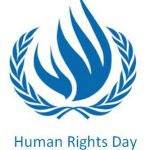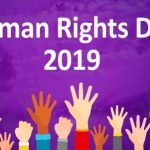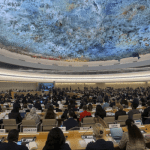Saudi Arabia’s attempt to join the United Nations Human Rights Council was rejected by UN members, despite protests from campaigners who claim the Gulf country remains one of the world’s worst human rights violators.
The United Nations General Assembly, on Wednesday, elected 18 new members to the 47-member council, including Switzerland, South Korea, and Ethiopia.
Seats are assigned according to regional groups, and most nations ran unopposed. The “Asia-Pacific” region, which included Saudi Arabia, Thailand, and Qatar, was an outlier, with six countries competing for five seats.
The Human Rights Council has a long history of including members with checkered records on the very issue it’s supposed to help oversee.
China and Cuba were reelected for additional three-year terms last year. Venezuela and Russia recently sat on the council.
Despite its controversial membership roster, the council has shined a light on human rights violators in some countries.
A fact-finding mission established by the group found Venezuela’s government has committed crimes against humanity against dissidents following July’s contested election.
Council-mandated experts also have focused on deteriorating human rights conditions in countries including Sudan and Haiti.
Israel’s treatment of Palestinians also has been sharply criticized by the council over the years, bringing complaints from the US of bias against its ally.
The vote comes as a setback for Saudi Arabia’s de facto ruler, Crown Prince Mohammed bin Salman, and his grand plan to reinvent the kingdom’s economy and open up society.
The country previously declined to join the council in 2020.
While Saudi Arabia has modernized in recent years, with the government limiting the influence of religious police, lifting a driving ban, and increasing female participation in the workforce, it continues to receive criticism from rights experts and nations.
According to a Human Rights Watch study from last year, Saudi authorities used explosives and weapons to kill hundreds of Ethiopian migrants and asylum seekers seeking to enter the Gulf kingdom.
Amnesty International reports that the country continues to carry out executions every two days.
Saudi Arabia’s attempt to join the United Nations Human Rights Council was rejected by UN members, despite protests from campaigners who claim the Gulf country remains one of the world’s worst human rights violators.
The United Nations General Assembly, on Wednesday, elected 18 new members to the 47-member council, including Switzerland, South Korea, and Ethiopia.
Seats are assigned according to regional groups, and most nations ran unopposed. The “Asia-Pacific” region, which included Saudi Arabia, Thailand, and Qatar, was an outlier, with six countries competing for five seats.
The Human Rights Council has a long history of including members with checkered records on the very issue it’s supposed to help oversee.
China and Cuba were reelected for additional three-year terms last year. Venezuela and Russia recently sat on the council.
Despite its controversial membership roster, the council has shined a light on human rights violators in some countries.
A fact-finding mission established by the group found Venezuela’s government has committed crimes against humanity against dissidents following July’s contested election.
Council-mandated experts also have focused on deteriorating human rights conditions in countries including Sudan and Haiti.
Israel’s treatment of Palestinians also has been sharply criticized by the council over the years, bringing complaints from the US of bias against its ally.
The vote comes as a setback for Saudi Arabia’s de facto ruler, Crown Prince Mohammed bin Salman, and his grand plan to reinvent the kingdom’s economy and open up society.
The country previously declined to join the council in 2020.
While Saudi Arabia has modernized in recent years, with the government limiting the influence of religious police, lifting a driving ban, and increasing female participation in the workforce, it continues to receive criticism from rights experts and nations.
According to a Human Rights Watch study from last year, Saudi authorities used explosives and weapons to kill hundreds of Ethiopian migrants and asylum seekers seeking to enter the Gulf kingdom.
Amnesty International reports that the country continues to carry out executions every two days.
Saudi Arabia’s attempt to join the United Nations Human Rights Council was rejected by UN members, despite protests from campaigners who claim the Gulf country remains one of the world’s worst human rights violators.
The United Nations General Assembly, on Wednesday, elected 18 new members to the 47-member council, including Switzerland, South Korea, and Ethiopia.
Seats are assigned according to regional groups, and most nations ran unopposed. The “Asia-Pacific” region, which included Saudi Arabia, Thailand, and Qatar, was an outlier, with six countries competing for five seats.
The Human Rights Council has a long history of including members with checkered records on the very issue it’s supposed to help oversee.
China and Cuba were reelected for additional three-year terms last year. Venezuela and Russia recently sat on the council.
Despite its controversial membership roster, the council has shined a light on human rights violators in some countries.
A fact-finding mission established by the group found Venezuela’s government has committed crimes against humanity against dissidents following July’s contested election.
Council-mandated experts also have focused on deteriorating human rights conditions in countries including Sudan and Haiti.
Israel’s treatment of Palestinians also has been sharply criticized by the council over the years, bringing complaints from the US of bias against its ally.
The vote comes as a setback for Saudi Arabia’s de facto ruler, Crown Prince Mohammed bin Salman, and his grand plan to reinvent the kingdom’s economy and open up society.
The country previously declined to join the council in 2020.
While Saudi Arabia has modernized in recent years, with the government limiting the influence of religious police, lifting a driving ban, and increasing female participation in the workforce, it continues to receive criticism from rights experts and nations.
According to a Human Rights Watch study from last year, Saudi authorities used explosives and weapons to kill hundreds of Ethiopian migrants and asylum seekers seeking to enter the Gulf kingdom.
Amnesty International reports that the country continues to carry out executions every two days.
Saudi Arabia’s attempt to join the United Nations Human Rights Council was rejected by UN members, despite protests from campaigners who claim the Gulf country remains one of the world’s worst human rights violators.
The United Nations General Assembly, on Wednesday, elected 18 new members to the 47-member council, including Switzerland, South Korea, and Ethiopia.
Seats are assigned according to regional groups, and most nations ran unopposed. The “Asia-Pacific” region, which included Saudi Arabia, Thailand, and Qatar, was an outlier, with six countries competing for five seats.
The Human Rights Council has a long history of including members with checkered records on the very issue it’s supposed to help oversee.
China and Cuba were reelected for additional three-year terms last year. Venezuela and Russia recently sat on the council.
Despite its controversial membership roster, the council has shined a light on human rights violators in some countries.
A fact-finding mission established by the group found Venezuela’s government has committed crimes against humanity against dissidents following July’s contested election.
Council-mandated experts also have focused on deteriorating human rights conditions in countries including Sudan and Haiti.
Israel’s treatment of Palestinians also has been sharply criticized by the council over the years, bringing complaints from the US of bias against its ally.
The vote comes as a setback for Saudi Arabia’s de facto ruler, Crown Prince Mohammed bin Salman, and his grand plan to reinvent the kingdom’s economy and open up society.
The country previously declined to join the council in 2020.
While Saudi Arabia has modernized in recent years, with the government limiting the influence of religious police, lifting a driving ban, and increasing female participation in the workforce, it continues to receive criticism from rights experts and nations.
According to a Human Rights Watch study from last year, Saudi authorities used explosives and weapons to kill hundreds of Ethiopian migrants and asylum seekers seeking to enter the Gulf kingdom.
Amnesty International reports that the country continues to carry out executions every two days.
Saudi Arabia’s attempt to join the United Nations Human Rights Council was rejected by UN members, despite protests from campaigners who claim the Gulf country remains one of the world’s worst human rights violators.
The United Nations General Assembly, on Wednesday, elected 18 new members to the 47-member council, including Switzerland, South Korea, and Ethiopia.
Seats are assigned according to regional groups, and most nations ran unopposed. The “Asia-Pacific” region, which included Saudi Arabia, Thailand, and Qatar, was an outlier, with six countries competing for five seats.
The Human Rights Council has a long history of including members with checkered records on the very issue it’s supposed to help oversee.
China and Cuba were reelected for additional three-year terms last year. Venezuela and Russia recently sat on the council.
Despite its controversial membership roster, the council has shined a light on human rights violators in some countries.
A fact-finding mission established by the group found Venezuela’s government has committed crimes against humanity against dissidents following July’s contested election.
Council-mandated experts also have focused on deteriorating human rights conditions in countries including Sudan and Haiti.
Israel’s treatment of Palestinians also has been sharply criticized by the council over the years, bringing complaints from the US of bias against its ally.
The vote comes as a setback for Saudi Arabia’s de facto ruler, Crown Prince Mohammed bin Salman, and his grand plan to reinvent the kingdom’s economy and open up society.
The country previously declined to join the council in 2020.
While Saudi Arabia has modernized in recent years, with the government limiting the influence of religious police, lifting a driving ban, and increasing female participation in the workforce, it continues to receive criticism from rights experts and nations.
According to a Human Rights Watch study from last year, Saudi authorities used explosives and weapons to kill hundreds of Ethiopian migrants and asylum seekers seeking to enter the Gulf kingdom.
Amnesty International reports that the country continues to carry out executions every two days.
Saudi Arabia’s attempt to join the United Nations Human Rights Council was rejected by UN members, despite protests from campaigners who claim the Gulf country remains one of the world’s worst human rights violators.
The United Nations General Assembly, on Wednesday, elected 18 new members to the 47-member council, including Switzerland, South Korea, and Ethiopia.
Seats are assigned according to regional groups, and most nations ran unopposed. The “Asia-Pacific” region, which included Saudi Arabia, Thailand, and Qatar, was an outlier, with six countries competing for five seats.
The Human Rights Council has a long history of including members with checkered records on the very issue it’s supposed to help oversee.
China and Cuba were reelected for additional three-year terms last year. Venezuela and Russia recently sat on the council.
Despite its controversial membership roster, the council has shined a light on human rights violators in some countries.
A fact-finding mission established by the group found Venezuela’s government has committed crimes against humanity against dissidents following July’s contested election.
Council-mandated experts also have focused on deteriorating human rights conditions in countries including Sudan and Haiti.
Israel’s treatment of Palestinians also has been sharply criticized by the council over the years, bringing complaints from the US of bias against its ally.
The vote comes as a setback for Saudi Arabia’s de facto ruler, Crown Prince Mohammed bin Salman, and his grand plan to reinvent the kingdom’s economy and open up society.
The country previously declined to join the council in 2020.
While Saudi Arabia has modernized in recent years, with the government limiting the influence of religious police, lifting a driving ban, and increasing female participation in the workforce, it continues to receive criticism from rights experts and nations.
According to a Human Rights Watch study from last year, Saudi authorities used explosives and weapons to kill hundreds of Ethiopian migrants and asylum seekers seeking to enter the Gulf kingdom.
Amnesty International reports that the country continues to carry out executions every two days.
Saudi Arabia’s attempt to join the United Nations Human Rights Council was rejected by UN members, despite protests from campaigners who claim the Gulf country remains one of the world’s worst human rights violators.
The United Nations General Assembly, on Wednesday, elected 18 new members to the 47-member council, including Switzerland, South Korea, and Ethiopia.
Seats are assigned according to regional groups, and most nations ran unopposed. The “Asia-Pacific” region, which included Saudi Arabia, Thailand, and Qatar, was an outlier, with six countries competing for five seats.
The Human Rights Council has a long history of including members with checkered records on the very issue it’s supposed to help oversee.
China and Cuba were reelected for additional three-year terms last year. Venezuela and Russia recently sat on the council.
Despite its controversial membership roster, the council has shined a light on human rights violators in some countries.
A fact-finding mission established by the group found Venezuela’s government has committed crimes against humanity against dissidents following July’s contested election.
Council-mandated experts also have focused on deteriorating human rights conditions in countries including Sudan and Haiti.
Israel’s treatment of Palestinians also has been sharply criticized by the council over the years, bringing complaints from the US of bias against its ally.
The vote comes as a setback for Saudi Arabia’s de facto ruler, Crown Prince Mohammed bin Salman, and his grand plan to reinvent the kingdom’s economy and open up society.
The country previously declined to join the council in 2020.
While Saudi Arabia has modernized in recent years, with the government limiting the influence of religious police, lifting a driving ban, and increasing female participation in the workforce, it continues to receive criticism from rights experts and nations.
According to a Human Rights Watch study from last year, Saudi authorities used explosives and weapons to kill hundreds of Ethiopian migrants and asylum seekers seeking to enter the Gulf kingdom.
Amnesty International reports that the country continues to carry out executions every two days.
Saudi Arabia’s attempt to join the United Nations Human Rights Council was rejected by UN members, despite protests from campaigners who claim the Gulf country remains one of the world’s worst human rights violators.
The United Nations General Assembly, on Wednesday, elected 18 new members to the 47-member council, including Switzerland, South Korea, and Ethiopia.
Seats are assigned according to regional groups, and most nations ran unopposed. The “Asia-Pacific” region, which included Saudi Arabia, Thailand, and Qatar, was an outlier, with six countries competing for five seats.
The Human Rights Council has a long history of including members with checkered records on the very issue it’s supposed to help oversee.
China and Cuba were reelected for additional three-year terms last year. Venezuela and Russia recently sat on the council.
Despite its controversial membership roster, the council has shined a light on human rights violators in some countries.
A fact-finding mission established by the group found Venezuela’s government has committed crimes against humanity against dissidents following July’s contested election.
Council-mandated experts also have focused on deteriorating human rights conditions in countries including Sudan and Haiti.
Israel’s treatment of Palestinians also has been sharply criticized by the council over the years, bringing complaints from the US of bias against its ally.
The vote comes as a setback for Saudi Arabia’s de facto ruler, Crown Prince Mohammed bin Salman, and his grand plan to reinvent the kingdom’s economy and open up society.
The country previously declined to join the council in 2020.
While Saudi Arabia has modernized in recent years, with the government limiting the influence of religious police, lifting a driving ban, and increasing female participation in the workforce, it continues to receive criticism from rights experts and nations.
According to a Human Rights Watch study from last year, Saudi authorities used explosives and weapons to kill hundreds of Ethiopian migrants and asylum seekers seeking to enter the Gulf kingdom.
Amnesty International reports that the country continues to carry out executions every two days.














